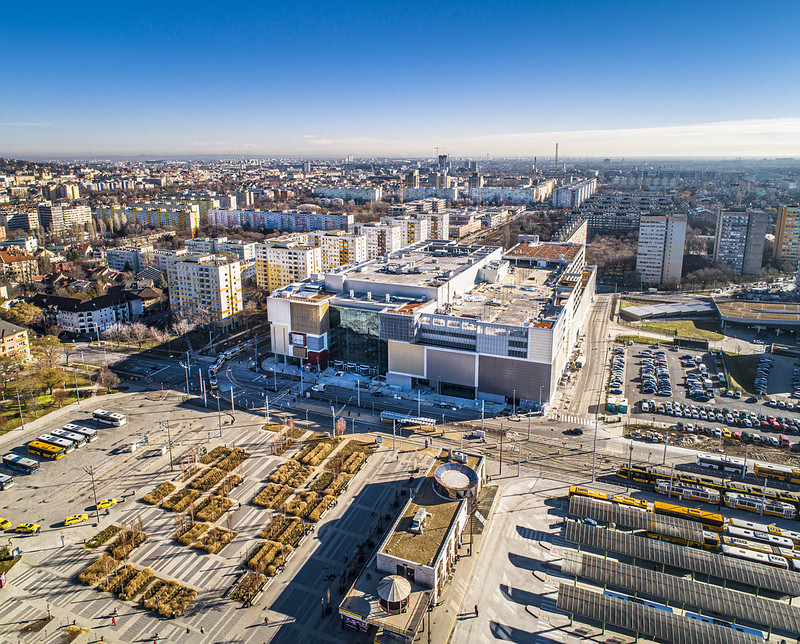Positive Prospects for Retail Sector

Etele Plaza is located at a major Budapest residential and transportation location.
The Hungarian retail market is regarded as being in a favorable position compared both to Central and Western Europe going forward, says Mike Edwards, head of capital markets at Cushman & Wakefield Hungary.
Hungarians still enjoy the physical experience of shopping centers and the country is a long way behind its Central European peers regarding shopping center stock. The country took time to bounce back from the global financial crisis of 2007-2008 and there have been no Budapest shopping center openings for a decade, he told the Cushman & Wakefield “What’s Next in Retail?” online presentation and discussion.
Purchases by e-commerce have doubled over the past two years as Hungary has moved closer to the online European average. Physical clothing and footwear outlets have been the most negatively impacted by the coronavirus and resulting lockdowns; Hungarian retail SMEs are under the most pressure.
“Changes in the retail sector have been ongoing for the last five-to-10 years, although the evidence is that people like going out. Schemes will focus more attention on footfall with the two key areas consisting of food and beverage and leisure,” said Viktória Szabó, head of retail agency at Cushman & Wakefield Hungary.
Hungary has 55 shopping centers in Hungary, 22 of which are in Budapest according to Cushman & Wakefield. Oversupply is not considered an issue with a total shopping center stock of 1.3 million sqm GLA (or 129 sqm GLA per 1,000 people), well below the CEE average.
The average footfall at the Pólus and Campona shopping centers has fallen by 30% over the past year according to Mátyás Gereben, country manager at CPI Hungary, owner of the two developments.
Good News
“The good news is that footfall in retail parks has remained on the same level as pre-pandemic,” he said. Indeed, outside of the capital, SES Spar European Shopping Centers has delivered the S-Park Kaposvár (190 km southwest of Budapest).
“There is a need to communicate with shopping center tenants in order to find long term solutions. Occupancy stands at 96% in our centers and as people need to touch what they are buying, there is a need to make people feel safe in this environment,” he added.
The only major Budapest shopping center under construction is the EUR 300 million Etele Plaza by Futureal, which is due to open this September. The 55,000 sqm project has been ongoing for several years and was delayed several times due to concerns over consumer spending levels in the aftermath of the economic and financial crisis and, more recently, the impact of the coronavirus on the retail market. Etele Plaza is located at a transport hub at the Kelenföld railway station and Metro line 4.
“This is not the easiest time to open a shopping center, although by September the project will be almost fully let. There has been no shopping center openings over the last 10 years and, in that time, purchasing power has risen,” commented Tibor Tatár, CEO of commercial and retail development at Futureal.
“The advantage of Etele Plaza is that it is at the third busiest transport hub in Budapest and this could possibly become the busiest. Further, there is a quarter of a million people living with a 10 minute radius. We have a strong tenant mix and a large food court with a 200 seat terrace,” he added.
This article was first published in the Budapest Business Journal print issue of April 23, 2021.
SUPPORT THE BUDAPEST BUSINESS JOURNAL
Producing journalism that is worthy of the name is a costly business. For 27 years, the publishers, editors and reporters of the Budapest Business Journal have striven to bring you business news that works, information that you can trust, that is factual, accurate and presented without fear or favor.
Newspaper organizations across the globe have struggled to find a business model that allows them to continue to excel, without compromising their ability to perform. Most recently, some have experimented with the idea of involving their most important stakeholders, their readers.
We would like to offer that same opportunity to our readers. We would like to invite you to help us deliver the quality business journalism you require. Hit our Support the BBJ button and you can choose the how much and how often you send us your contributions.







